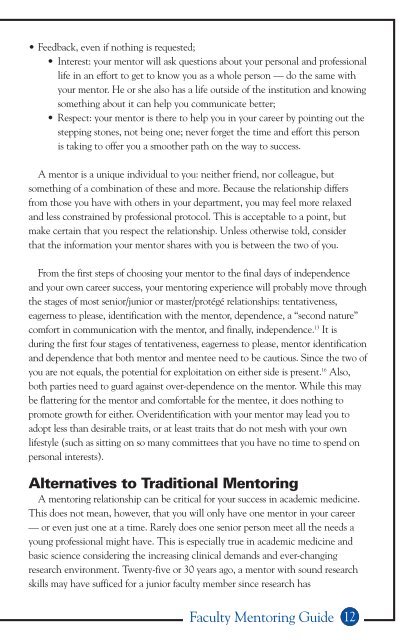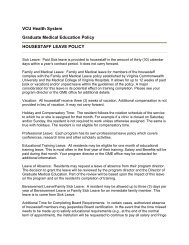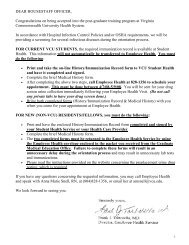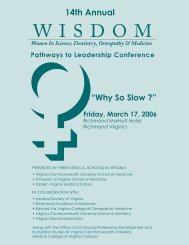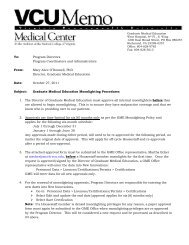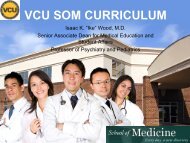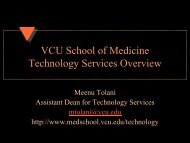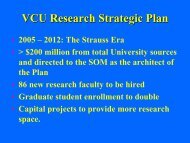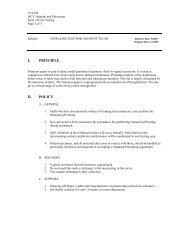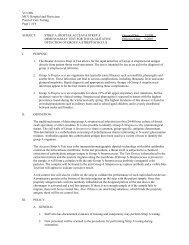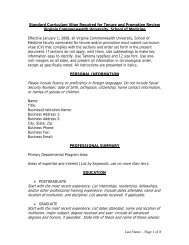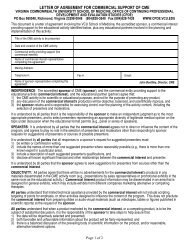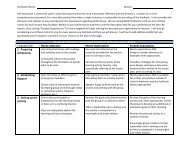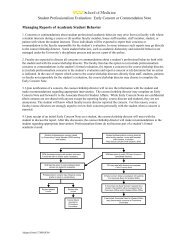Faculty Mentoring Guide - Virginia Commonwealth University ...
Faculty Mentoring Guide - Virginia Commonwealth University ...
Faculty Mentoring Guide - Virginia Commonwealth University ...
You also want an ePaper? Increase the reach of your titles
YUMPU automatically turns print PDFs into web optimized ePapers that Google loves.
• Feedback, even if nothing is requested;<br />
• Interest: your mentor will ask questions about your personal and professional<br />
life in an effort to get to know you as a whole person — do the same with<br />
your mentor. He or she also has a life outside of the institution and knowing<br />
something about it can help you communicate better;<br />
• Respect: your mentor is there to help you in your career by pointing out the<br />
stepping stones, not being one; never forget the time and effort this person<br />
is taking to offer you a smoother path on the way to success.<br />
A mentor is a unique individual to you: neither friend, nor colleague, but<br />
something of a combination of these and more. Because the relationship differs<br />
from those you have with others in your department, you may feel more relaxed<br />
and less constrained by professional protocol. This is acceptable to a point, but<br />
make certain that you respect the relationship. Unless otherwise told, consider<br />
that the information your mentor shares with you is between the two of you.<br />
From the first steps of choosing your mentor to the final days of independence<br />
and your own career success, your mentoring experience will probably move through<br />
the stages of most senior/junior or master/protégé relationships: tentativeness,<br />
eagerness to please, identification with the mentor, dependence, a “second nature”<br />
comfort in communication with the mentor, and finally, independence. 13 It is<br />
during the first four stages of tentativeness, eagerness to please, mentor identification<br />
and dependence that both mentor and mentee need to be cautious. Since the two of<br />
you are not equals, the potential for exploitation on either side is present. 16 Also,<br />
both parties need to guard against over-dependence on the mentor. While this may<br />
be flattering for the mentor and comfortable for the mentee, it does nothing to<br />
promote growth for either. Overidentification with your mentor may lead you to<br />
adopt less than desirable traits, or at least traits that do not mesh with your own<br />
lifestyle (such as sitting on so many committees that you have no time to spend on<br />
personal interests).<br />
Alternatives to Traditional <strong>Mentoring</strong><br />
A mentoring relationship can be critical for your success in academic medicine.<br />
This does not mean, however, that you will only have one mentor in your career<br />
— or even just one at a time. Rarely does one senior person meet all the needs a<br />
young professional might have. This is especially true in academic medicine and<br />
basic science considering the increasing clinical demands and ever-changing<br />
research environment. Twenty-five or 30 years ago, a mentor with sound research<br />
skills may have sufficed for a junior faculty member since research has<br />
<strong>Faculty</strong> <strong>Mentoring</strong> <strong>Guide</strong> 12


